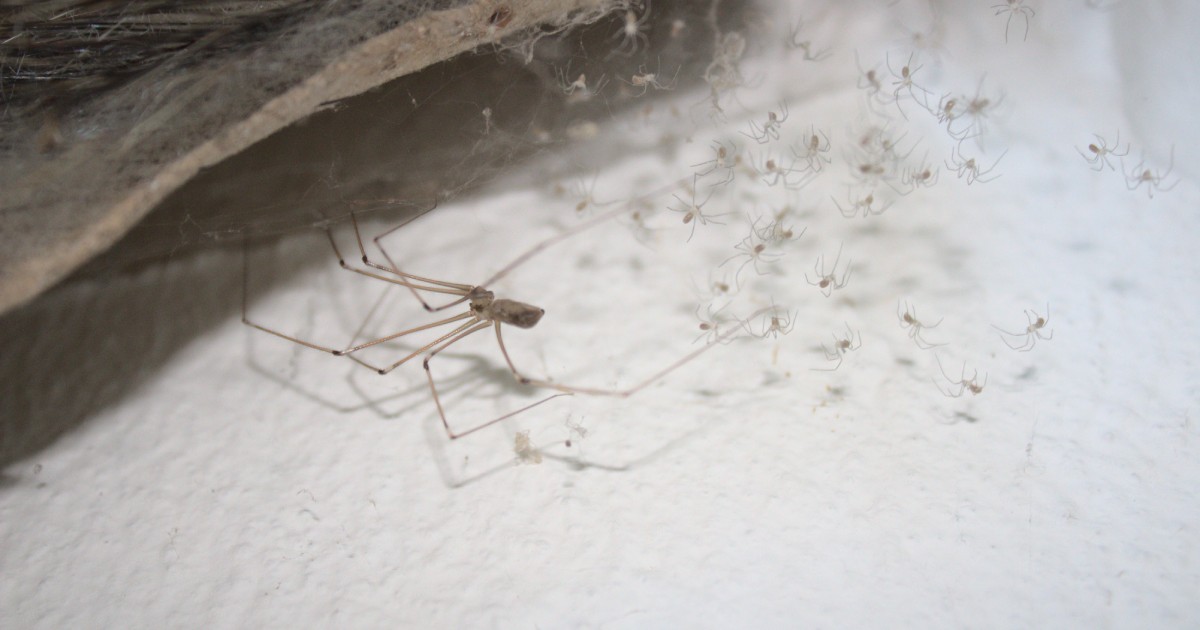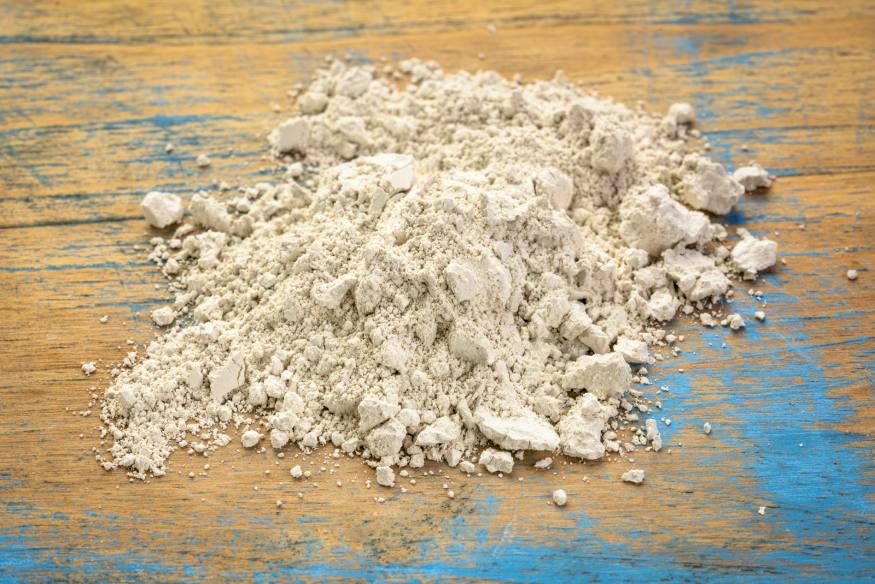Whether your basement is the main hangout for the family or a bleak unfinished storage room, there’s one thing nobody wants to see down there: spiders. Despite this universal disfavor, most basements are home to not just one but hundreds of spiders.
If you’re sick of sharing your basement with spiders, you’ve come to the right place. Below, we’ll show you four simple things you can do to keep spiders from setting up shop in your lower level. We’ll also show you how to get rid of spiders that have already made their way inside.

How to Keep Spiders Out of the Basement
There are two reasons why spiders come inside our houses. They are either after food or a warm place to spend the winter. The basement provides the optimal space for either.
Damp, dark, and often filled with stuff, basements are an excellent place for all types of insects to hang out. And, spiders follow these other bugs into your house in search of an easy meal.
Info: During fall, the basement is often the most accessible level for spiders looking to get out of the cold.
In either case, there are a few easy steps you can take to make your basement less accessible and appealing to spiders and other insects.
Use a Repellent

From natural and DIY to commercial made, spider repellents come in many forms. They all have one thing in common, though: they contain ingredients that spiders don’t like. Usually, this means something with a strong odor or a chemical that spiders avoid because they know it can hurt them.
Natural Spider Repellents
Natural spider repellents are easy to find and even easier to make at home. The most common are strong scented essential oils like:
- Citrus oil
- Clove oil
- Cinnamon oil
- Eucalyptus oil
- Peppermint oil
- Spanish chestnuts
- Garlic
You can also easily find premixed and ready-to-use natural commercial products. They are easy to apply and often utilize potent ingredients to help repel a variety of insects. One of our favorite products is Mighty Mint’s Spider Repellent.
If you’d rather make your own spider spray, it is easy enough to do so. Most DIY repellents utilize the same basic formula:
- 1 to 2 mL of essential oil
- 1 cup of water
- A dab of soap to mix
Add those ingredients to a spray bottle and apply liberally to corners, around egress windows, vents, and any other areas where spiders tend to accumulate.
Chemical Repellents

When we talk about chemical repellents, what we’re referring to is commercial spider spray. While these products are advertised as insect killers, they also work to repel insects trying to move into your basement.
Info: Spiders and other bugs taste with their feet – they can tell if they’re approaching a substance that can hurt them.
A chemical spider spray will kill any insect it gets in contact with during the application process. It will also repel any others that come across the sprayed area.
Use an Ultrasonic Device

How useful ultrasonic pest control devices are, remains a question in the scientific community. But many homeowners swear by them for keeping spiders, insects, and other pests away.
If you are looking for a cheap, hands-off solution to your basement spider problem, these are worth a try. These inexpensive little devices emit a high-frequency noise that is too high for humans to hear but is supposed to be bothersome enough for pests to drive them away.
One product that seems to be more effective against spiders than others are TOMPOL repellers.
Reduce the Clutter

Clutter is a multifaceted problem when it comes to attracting spiders.
Spiders that move into your house to overwinter will instinctively seek out small crevices – spiders looking to lay eggs will do the same.
But where clutter really becomes a problem is when it attracts other bugs that spiders eat. Beetles, earwigs, centipedes, and many other ground-dwelling bugs are most at home living under boxes and hiding in small spaces. Getting rid of clutter can help eliminate spiders’ food sources and force them to move elsewhere.
Move Wood Piles
Wood piles are infamous for attracting bugs of all kinds. Many species of spiders actively seek out a bark to hide under during the cold months. And the wood itself can be home to hundreds of small bugs that spiders like to feed on.
Note: Instead of stacking your firewood and old lumber in the basement, try to find a place for it outside, or at the very least, in the garage or shed.
Keep Clutter Off the Ground
If you use your basement for storage, you should keep boxes and other items off the ground. Invest in a shelving unit or wall shelves to keep the floor clear. While this won’t remove spiders’ hiding places, it will create less habitat for the ground-dwelling insects they like to feed on.
Using solid containers with tight-fitting lids can also help reduce insect habitat in your basement. Food, clothing, and other items that attract insects should always be kept in sealed containers to avoid feeding bugs and helping them multiply in your house.
Seal Entry Points
The most important step to eradicating spiders from your basement is to prevent them from getting in.
Windows
Egress windows, especially those that are opened on occasion, provide an easy way for bugs to make their way into your basement. By sealing the edges with silicone, getting tight-fitting screens, and addressing any gaps in the sill, you can prevent spiders from moving out of the window well and into your basement.
Foundation Gaps
There are many reasons spiders tend to congregate in basements, but the most common is accessibility. Gaps and cracks in foundations offer easy entry for these soft-bodied arachnids. Once inside the walls, it is easy for spiders to find their way inside.
For finished basements, be sure to caulk under your baseboard and fill any gaps in your flooring. For unfinished basements, your best bet is to address foundation cracks from the outside in, sealing any you find concrete caulk. You should also check around vent points, piping, and anywhere else something passes through the wall to the outside.
How to Get Rid of Spiders Already In the Basement
Your best offense against spiders is a good defense. But if you already have a decent population of arachnids in your basement, you’ll need to play a little of both.
Here are a few tried-and-true methods for getting rid of spiders that are already in your basement.
Spread Diatomaceous Earth

Diatomaceous earth is a fine white powder made from the fossilized remains of diatoms, tiny sea creatures that lived millions of years ago. It is largely made up of crystallized silica, a natural mineral that is both abrasive and hydrophilic.
These two characteristics make it so dangerous to spiders while being relatively benign for larger animals and humans.
Info: When an insect walks across diatomaceous earth, the silica sticks to them, cutting into their exoskeleton and absorbing water and oil from their bodies. This process very quickly dries the spider out and kills it.
By spreading diatomaceous earth in your basement where bugs like to hang out, you can quickly eradicate them. We suggest applying this fine powder evenly along walls, in corners, on window sills, and on any other horizontal surface where you tend to see spiders.
Use Spider Traps
Spider traps are another simple way to kill spiders and other insects that have already made your basement their home. These traps usually consist of a stiff piece of paperboard that has been coated in a sticky glue. When spiders walk across the glue, they get stuck.
You can lay the traps flat in corners and along walls or folded to fit in tight crevices between appliances and storage boxes.
Once a trap is filled with dried-out spiders, be sure to change it out for a fresh one.
Use Insect Spray
Chemical or natural insect sprays can kill spiders already in your home. The downside to using this method is you have to search out and find the spiders. Spraying the ground as you would when applying a repellent may end up killing a few spiders who happen to walk across the barrier while it is still wet, but most are smart enough to avoid walking through a fatal dose of these chemicals.
Buy a Spider Catcher
As you deal with your basement spider problem, you’ll realize that they aren’t the enemy. These creepy-crawlies spend their days ridding the world of other insect pests that do a lot more harm to our crops and humans than they do. Plus, the vast majority of spiders out there can’t or won’t bite humans and genuinely mean us no harm.
For that reason, the spider catcher is one of my favorite tools for dealing with spiders inside the house. This ingenious little tool uses fine plastic bristles attached to a trigger to grab and hold onto bugs. Once secured, the spider can then be transferred back outside where it belongs.
And, thanks to the long handle, you can keep a safe distance. It’s certainly a much less creepy alternative to catching spiders in a cup!
The Bottom Line on Keeping Your Basement Spider-Free
When it comes to keeping spiders out of your basement, there are two things you have to do.
First, you must take steps to help keep spiders from coming into your basement in the first place. You can do this by using repellents and ultrasonic devices, reducing the clutter, and sealing entry points into your basement.
Once you have reduced the appeal of your basement and worked to prevent spiders from getting in, only then should you tackle the spiders that are already inside. You can do this by using diatomaceous earth, spider traps, insect sprays, or a catch-and-release spider catcher.